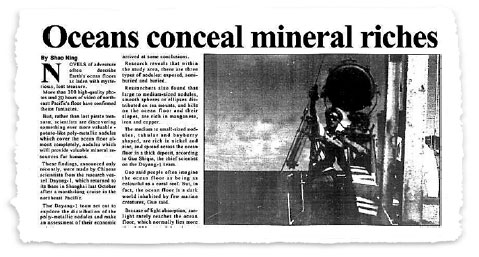This Day, That Year: March 5

Editor's note: This year marks the 70th anniversary of the founding of New China.
On March 5, 1991, China became the fifth country to search the seabed in the Pacific Ocean for polymetallic nodules.
These are rocks, mostly about the size of a potato, on the seabed containing metals such as cobalt, manganese, iron, nickel and aluminum, which have huge economic potential.
Scientists estimate that about 480 million to 13.5 billion metric tons of polymetallic nodules can be commercially mined, according to Science and Technology Daily.
An item on Aug 14, 1996, from China Daily showed researchers on the Dayang-1 preparing instruments to collect and assess the nodules from the Pacific Ocean.

Although a latecomer to deep-sea exploration, China won the right to search for polymetallic nodules in the northeastern Pacific Ocean in 2001, for polymetallic sulfide deposits in the southwestern Indian Ocean in 2011 and for cobalt-rich ferromanganese crusts in the western Pacific in 2014.
China has been accelerating its pace in developing technologies for commercial mining of the minerals on the seabed.
The country is also improving its legal system related to deep-sea exploration and mining to regulate deep-sea activities and protect the ocean, according to the China Institute for Marine Affairs, a think tank for the country's ocean watchdog.
- China activates emergency response as Typhoon Matmo approaches
- Over 230 anticancer drugs feature in national medical insurance catalog
- South China provinces activate Level-IV emergency typhoon response
- Xi congratulates Luxembourg's Grand Duke Guillaume on enthronement
- Prison terms issued over deadly 2023 Shanxi coal company fire
- PLA Navy ships depart HKSAR after open ship events




































